RUSH: My buddy Andy McCarthy — I saw Andy last night at the National Review Institute dinner where I was awarded the William F. Buckley Award for Leadership and Political Thought.
 Folks, I got the hook last night. (laughing) I have never gotten the hook. I have never gotten the hook. I got the hook when the audience was loving it! I got the hook, they came out and put a stop to it and the audience was chanting, “More! More! More!” Right? Snerdley was there.
Folks, I got the hook last night. (laughing) I have never gotten the hook. I have never gotten the hook. I got the hook when the audience was loving it! I got the hook, they came out and put a stop to it and the audience was chanting, “More! More! More!” Right? Snerdley was there.
Now, there’s a couple reasons why I got the hook. One of them, I was way over time. Gay Gaines was the other award recipient, and they told us 15 minutes max. “We want to maintain a tight schedule here. We want to go to the after-party, the dining and the dancing and all that at 9 o’clock.”
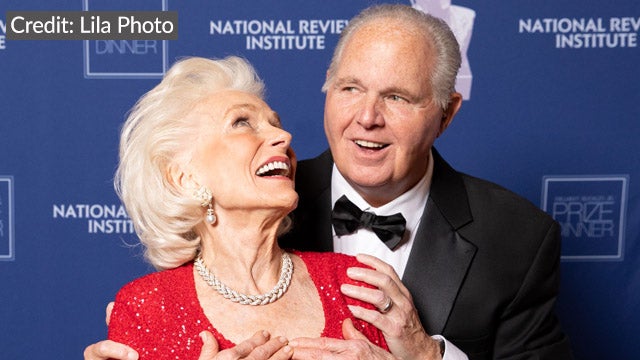
I said, “Okay.” Well, I think they came and got me, what, in 25 minutes? Nobody would know because everybody was enraptured, folks, nobody wanted it to end. But Rich Lowry came out and was leading a bunch of applause, created a standing O. That’s how I got the hook. And I have since had some people say, “You know, Rush, you got the hook right in the middle of your brilliant entreaty telling everybody why it’s important to defend Donald Trump because it’s defending ourselves. That’s when they came and got you.”
I said, “Do you think there’s a conspiracy afoot here?”
“Well, I don’t know. I mean, but it’s very, very strange.”
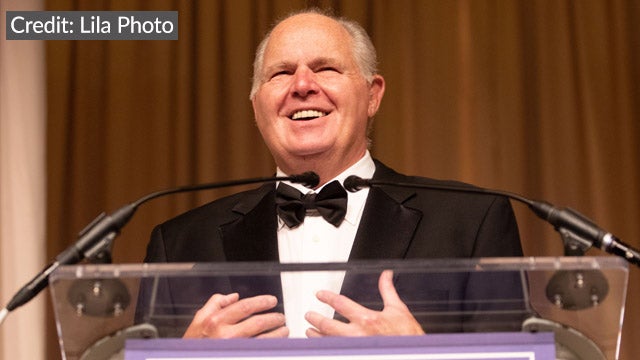
Anyway, the audience was chanting, “More, more, more.” Anyway, folks, it’s okay. It was funny. I’m sure I did a double-take. I’ve never gotten the hook before. Usually people get the hook because they’re dull and boring and are putting people to sleep. And I woke people up.
BREAK TRANSCRIPT
RUSH: By the way, the governor of Florida, Ron DeSantis, was in attendance at the National Review Institute last night. Now, he knows that there are no diplomas from the Limbaugh Institute for Advanced Conservative and Anti-Media Studies, and yet he said that if he could get one — because he thinks he’s qualified — he would hang it on the official wall in his governor’s office. That would be something, the governor of Florida having a diploma from Limbaugh Institute on the wall.
He actually gave me one of the greatest compliments I’ve ever had. He listed five great conservatives and put me in the list. Reagan, Scalia, Clarence Thomas… Right. Okay, so Reagan, Scalia, Clarence Thomas… Who was the fifth? Maybe he had me in there twice. There were… (interruption) Oh, God yes. That’s right. Buckley. Speaking of which, I have an audio sound bite of Buckley appearing on this program. It was July 13, 2004, and Buckley had new book out. Brothers No More was the title of it.
So I had him on to talk about the book, and whenever I had him here, I’d pick his brain about events. Man, what a resource. I miss Buckley. I wish he were here. I miss him being around. It would be great to be able to ask, “Bill, what do you think of X? What do you think of all this?” He’d have a take that nobody else has. Sometimes, it would disappoint you. Other times, it would invigorate you. So let’s listen to this. Back in 2004, Buckley identified the exclusionary impulse of the establishment to go after disrupters based on accusations of coarseness or incivility.
The bite takes about a minute, and here it is…
BEGIN ARCHIVE CLIP
RUSH: Bill, you know, as I study things today, you are now treated and received — and properly so — with great affection and great respect, and there are some who say that, “Oh, we wish for the old days of Buckley conservatism when it was urbane and erudite and polite.” They say that the modern era of conservatism has descended into harshness and other things, and —
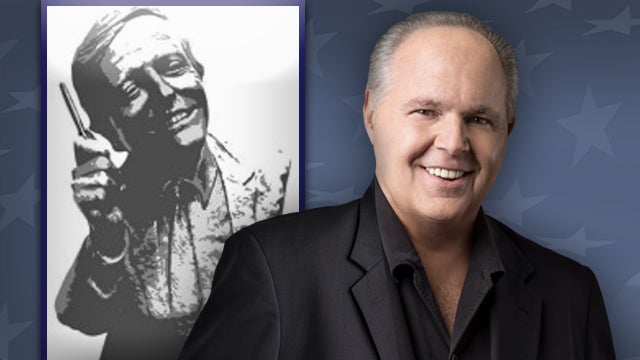 BUCKLEY: But that’s a weapon. People use that when they want to be anti-Limbaugh. They will say, “Well, Limbaugh belongs in that school of polemical thought which really should be excluded.” … [T]hey’ve done it to me in the past. I’m not saying that that criticism cannot be leveled. Sometimes it can be leveled. But to level it with the license that they use against you … speaks to me of a different motivation. They want to argue with you by simply outlawing your voice on the grounds that it is eccentric and extreme. It is, as I say, simply a polemical device.
BUCKLEY: But that’s a weapon. People use that when they want to be anti-Limbaugh. They will say, “Well, Limbaugh belongs in that school of polemical thought which really should be excluded.” … [T]hey’ve done it to me in the past. I’m not saying that that criticism cannot be leveled. Sometimes it can be leveled. But to level it with the license that they use against you … speaks to me of a different motivation. They want to argue with you by simply outlawing your voice on the grounds that it is eccentric and extreme. It is, as I say, simply a polemical device.
RUSH: Rather than debating the issues, disqualify and discredit the voice, then, is the technique?
BUCKLEY: I think that’s true.
END ARCHIVE CLIP
RUSH: Yes. Now what was fascinating is when Buckley had retired or was nearing it, it was very easy… And biographies of Buckley were written by leftists who longed for the days of Buckley. “Oh, why can’t conservatives today be like Buckley was?” What they really meant was, “Why can’t we go back to the days when there’s only one of these guys, and we only have him on PBS? There’s only one of these guys. He’s got his magazine. We don’t have to deal with a whole army of ’em. Why can’t we go back to that? Buckley was smart — unlike today’s conservatives.
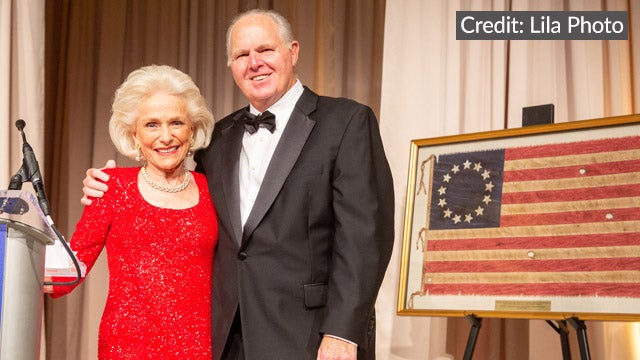 “Buckley was brilliant! He was a New Yorker. He was understanding. We could deal with Buckley. He was civil. He was sophisticated. He was unlike any of these people that have followed him,” and it was a myth. Buckley was not that guy in the early days of his coming out with the founding of National Review. He had an ongoing feud with Gore Vidal that even today would have been censored. Now, this is 1968. It’s on ABC TV. Buckley is talking with Gore Vidal. I’m not sure. This might have been on the old Dick Cavett Show. I’m not sure. I think this was. But get a load of this.
“Buckley was brilliant! He was a New Yorker. He was understanding. We could deal with Buckley. He was civil. He was sophisticated. He was unlike any of these people that have followed him,” and it was a myth. Buckley was not that guy in the early days of his coming out with the founding of National Review. He had an ongoing feud with Gore Vidal that even today would have been censored. Now, this is 1968. It’s on ABC TV. Buckley is talking with Gore Vidal. I’m not sure. This might have been on the old Dick Cavett Show. I’m not sure. I think this was. But get a load of this.
This is the sophisticated, the erudite.
This is, “Why can’t you conservatives be more like Buckley was.”
BEGIN ARCHIVE CLIP
VIDAL: You must realize what some of the political issues are here, that many —
BUCKLEY: You’re so naïve about it.
VIDAL: — people in the United States, uh, happen to believe that United States policy is wrong in Vietnam and the Viet Cong are correct in wanting to organize their country in their own way politically. This happens to be pretty much the opinion of Western Europe, and many other parts of the world. If it is a novelty in Chicago, that is too bad. But I assume that the point of American democracy —
BUCKLEY: And some people were pro-Nazi, too.
VIDAL: — is you can express any point of view you want.
BUCKLEY: Some people were pro-Nazi.
VIDAL: Shut up a minute.
BUCKLEY: No, I won’t. Some people were pro-Nazi, and the answer is that they were well treated by people who ostracized them, and I’m for ostracizing people who egg on other people to shoot American Marines and American soldiers. I know you don’t care because you don’t feel any sense of identification.
VIDAL: As f… As far as I’m concerned, the only, uh, crypto-Nazi I can think of is yourself. Failing that, I’ll only say that we can’t have the right —
MODERATOR: Let’s… let’s… let’s not call names.
BUCKLEY: Now, listen you queer. Stop calling me a crypto-Nazi —
MODERATOR: Let’s… let’s… let’s stop calling names — and let’s get —
BUCKLEY: — or I’ll sock you in your goddamn face and you’ll stay plastered.
MODERATOR: Let’s… Gentlemen, let’s —
BUCKLEY: He can go back to his pornography and stop making any allusions of Nazism —
MODERATOR: I beg you to —
BUCKLEY: — to someone who was infantry in the last war.
END ARCHIVE CLIP
RUSH: (laughing) Let’s go to back to the civil days when Buckley was sophisticated. He called Gore Vidal a queer! Yeah, it was. It was ’68. The Democrats had blown up Chicago at their convention, and that’s what Vidal was talking about. He was saying, “Everybody thinks the Vietcong’s fine except these brainless twits in Chicago.” Then Buckley says, “Listen, you queer. Stop calling me a crypto-Nazi,” and the moderator says, “Let’s not call names.”
“[O]r or I’ll sock you in your blank-blank face and you’ll stay plastered,” Buckley said.
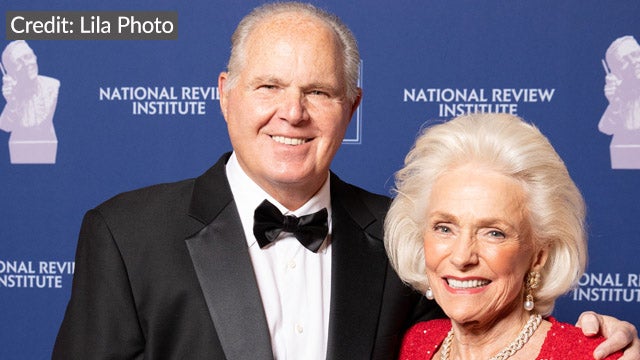 Oh, why can’t we go back to the days where conservatives were polite and civil and sophisticated — and most people couldn’t even understand ’em. Why can’t we go back to those days? Anyway, as I said last night and I’ve mentioned this before, one of the greatest — I will call it an accomplishment, an achievement was to be able to meet and get to know William F. Buckley. You know, we all have people in our lives who inspire us, motivate us. We all have people who, just by virtue of their existence, motivate us to see if we can be more or better than what we think we can. Buckley was that for me as was my father.
Oh, why can’t we go back to the days where conservatives were polite and civil and sophisticated — and most people couldn’t even understand ’em. Why can’t we go back to those days? Anyway, as I said last night and I’ve mentioned this before, one of the greatest — I will call it an accomplishment, an achievement was to be able to meet and get to know William F. Buckley. You know, we all have people in our lives who inspire us, motivate us. We all have people who, just by virtue of their existence, motivate us to see if we can be more or better than what we think we can. Buckley was that for me as was my father.
A lot of people have been. Those are the people in life you remember: The great teachers. I remember growing up, ah, like everybody else I had teachers I liked and teachers I didn’t. It turns out that as I got older and looked back on it, the teachers that I didn’t like were actually the ones that didn’t let me be me. They showed me I could do more than I thought I could. Those are the great teachers, the great motivators. Everybody should have a chance to interact with people that affect them that way, and Mr. Buckley was certainly one of those for me.
BREAK TRANSCRIPT
RUSH: By the way, how prescient was William Buckley talking about how the left uses the accusation that people are coarse and uncivil and unsophisticated, talk about the way they have tried to discredit Trump. I mean, even the Never Trumpers have picked up this weapon. They hate Trump because of the way he talks. You talk about elitist and superiorist.


